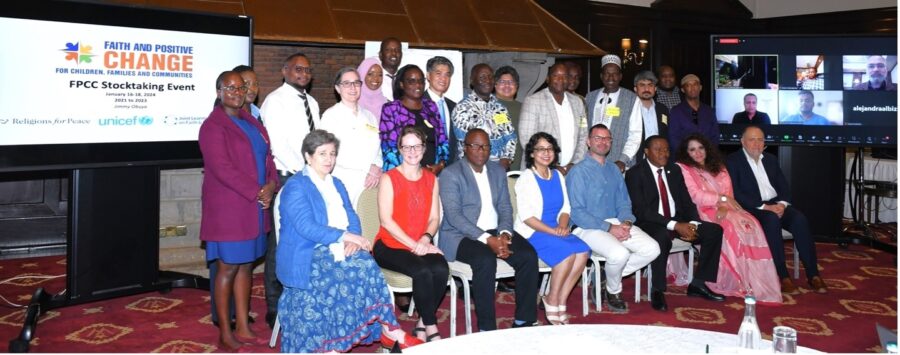Religions for Peace, UNICEF and JLI Convene the Five-Year FPCC Global Stocktaking Meeting in Nairobi, Kenya

Religions for Peace, UNICEF, the Joint Learning Initiative on Faith & Local Communities (JLI) and various faith-based organisations convened in Nairobi from 16 to 17 January 2024 for a meeting to ‘take stock’ on the progress and achievements of the first five years of the Faith for Positive Change for Children, Families and Communities (FPCC) initiative.
Delegations from Religions for Peace present included representatives from the Religions for Peace International Secretariat in New York, Africa, Asia, Latin America & the Caribbean with additional virtual participation from Religions for Peace Europe and UNICEF, JLI and FBO regional representatives.
At the end of the meeting, there was a unanimous conclusion on the strategic importance and need of FPCC as the key faith engagement approach in mobilising and advancing multi-religious and multi-stakeholder collaboration for children, families and communities. By mobilising their spiritual, moral, social and institutional assets, Religions for PeaceInternational, regional and national Interreligious Councils made a commitment to expand the scope, reach and partnership of the FPCC initiative noting the strategic advantage of collaborating with faith-based organisations and other government, academic, research and institutional partners. The FBOs present included: Arigatou GNRC, Association of Evangelicals in Africa, CORAT Africa, Sarvodaya Sri Lanka and other global FBOs forming the JLI board. The partners committed to continued and structured engagement by building on each other’s comparative strengths and presenting sustainable and impactful approaches and models to faith engagement.
UNICEF HQ and regional teams from Africa, South Asia, Latin America & Caribbean, Middle East and North Africa led in the unpacking of child priority result areas and opportunities for faith engagement in accelerating child priority outcomes. These include the focus on increasing immunisation demand and uptake; linking faith, children and climate change effects; mental health and youth engagement.
The partnership formulated regional and global strategies for 2024 with a focus on advancing joint stakeholder action for children, families and communities. There was an emphasis on building on evidence and research on what works with a particular focus on the recent FPCC Survey on Behavioural Drivers and Barriers to COVID-19 and Routine Under 5 Vaccine Uptake Within Faith Communities. The survey targeted 20,000 respondents in ten countries across five regions and the insights from the report provided key reflection points on areas of focus for the 2024-2025 FPCC plans.
The meeting aimed at understanding the changes and emerging situations, issues, and challenges affecting children to realign priorities and approaches. The partners sought to make the FPCC initiative more effective and responsive as a faith engagement mechanism in responding to issues affecting children, families and communities. This focus included strengthening partnership with various faith-based institutions that work for and with children. Another priority was to further strengthen coordination and collaboration to promote meaningful and increased faith engagement at global, regional, and national levels.
The key contribution of Religions for Peace in this partnership is the convening of multi-religious and multi-faith leaders and communities as drivers and influences of behaviour change. We are also advancing the engagement of religious actors at the frontline of action including working within and with communities.
The FPCC partners’ commitment during the two days emphasised on collaboration as key to providing the best environment for children to develop their best potential and promote their wellbeing based on the diverse spiritualities and faith traditions.
Religions for Peace is committed to leading efforts to advance effective multi-religious cooperation for peace on global, regional, national and local levels. Our focus is to ensure that the religious communities organised on these same levels assume and exercise appropriate leadership and ownership of these efforts. Multi-religious cooperation for peace and shared well-being is the hallmark of Religions for Peace. This cooperation includes but also goes beyond dialogue and bears fruit in common concrete actions.